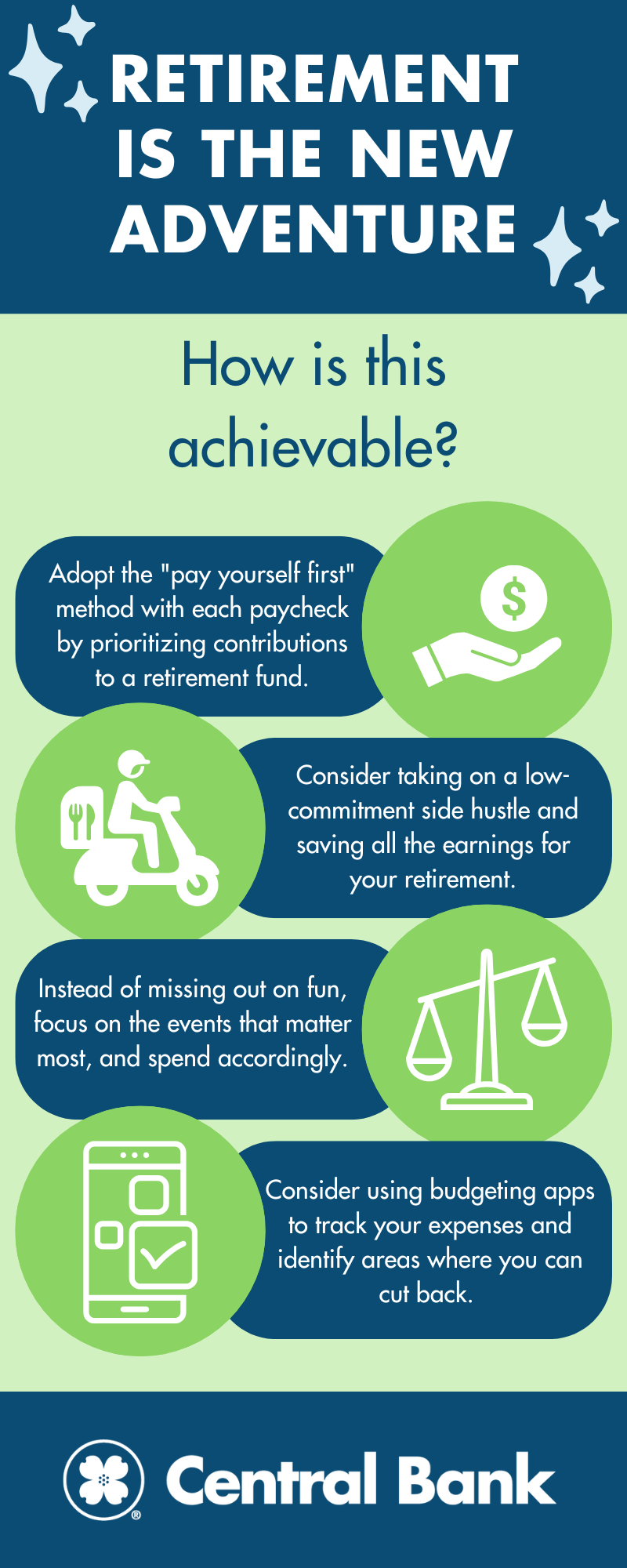Rather than something you dread, saving for retirement should be something to look forward to! Think of how good Fridays feel when you’re done with school or work and can relax. This is what retirement is like, except on a much larger scale. Your years of hard work and dedication will pay off, and you can finally hang up your work attire and choose to spend your later years the way you want! You can visit all seven continents with your partner, move to a beach town, or even pick up a new hobby you never knew you’d enjoy. Retirement can be all this and more!
The Benefits of Saving Early for Retirement
- Lower Amounts: The earlier you start saving, the lower your contributions can be. If you wait until you’re much older, the amount you need to save will be higher to offset the years when you didn’t save anything. For example, you may want about $1.5 million to retire when you're 65. If you start saving at 25 you’ll put aside around $425 a month. If you wait until you’re 35, you'll need to save around $1,000 a month. (This example assumes an 8% annual return.)
- Flexibility: If you save early, it creates a safety net in case you need to put your money towards something else for a little while. For example, if you suddenly need to buy a new car and temporarily stop or reduce the contributions to your retirement savings, starting early can ease the stress because you will already have some funds set aside.
- Possible Employer Match: Some organizations have a retirement plan. Check with your organization's benefits team to see if there is a match where you work. This can result in more money saved for your retirement in the earlier years.
- Stress-Free Life: Knowing that you’ve started saving for retirement allows you to live more freely without worry. You won’t have it constantly in the back of your mind, and you won’t feel guilty about spending on other items.

Balancing Lifestyle and Saving for Retirement
Saving for retirement doesn’t mean sacrificing your current lifestyle! You can still enjoy many of the things you do now, but saving for retirement early and consistently allows you to keep a future-forward mindset.
- Pay Yourself First: Adopt the "pay yourself first" method whenever you receive your paycheck. This means putting money into a retirement fund first and spending the rest on whatever you need. This allows you to still enjoy fun activities while contributing to your retirement. Pro tip: automate your retirement savings so it goes directly into the retirement account. That way it is one less step for you to have to take every payday!
- Get a Side Hustle: You may decide you don’t want to cut anything out of your life to save for retirement. That’s okay! Many young people, especially Gen Z, may not have enough room in their budget due to student loans or other expenses. Consider picking up a low-commitment side hustle, and save all the money earned from it for your retirement.
- Focus on Value: Young people love experiences! Instead of depriving yourself of fun, prioritize the events that matter most. Have a friend’s birthday trip coming up soon, but also really want to buy those concert tickets? Consider which holds more value to you, and only spend money on that.
- Use Budgeting Apps: To understand how much you can save for retirement, get a clear view of where your money is going. Consider using a budgeting app like Money Manager to track your expenses, and see where you can cut back. You don’t have to eliminate any spending category, but cutting down helps.
Topics Gen Z Can Educate Themselves On for a Secure Retirement
You may not understand everything about retirement right now, and that’s okay! Every plan starts with baby steps. In the meantime, it’ll be helpful to gain knowledge on these topics:
- IRAs: An IRA (Individual Retirement Account) is a personal retirement savings account that offers tax advantages for individuals saving for retirement. It can be either Traditional or Roth, depending on your preference. There are contribution limits based on different criteria.
- Traditional Contributions: Contributions are deductible from taxes and your account grows tax-deferred. You pay taxes when you withdraw your funds in retirement. This helps lower your taxable income in the year you contribute.
- Roth Contributions: With these contributions you do not get a tax deduction in the year you contribute, but your account grows tax-free, and you won’t pay any taxes when you withdraw the money in retirement.
- 401(k): A 401(k) plan is a company-sponsored retirement account that allows employees to contribute a percentage of their income. Some may offer Traditional or Roth options, depending on your employer and the specific plan.
- FIRE Movement: The Financial Independence, Retire Early (FIRE) movement is a financial strategy focused on aggressively saving and investing to achieve early retirement and financial independence.
- Social Security: Social Security is a government program that provides financial benefits to retirees based on their work history and contributions during their working years. Understanding how Social Security benefits work can help you calculate your retirement age and plan for the future.
- Retirement Calculator: Using a retirement calculator can help you estimate how much you’ll need to save to meet your goals. This tool can project your savings and potential Social Security benefits to give you a clearer picture of your financial future.
Retirement is an Investment in Future Experiences
By saving now, you won’t experience FOMO (fear of missing out) later in life. Saving for retirement brings you closer to financial independence and allows for greater career flexibility. With aligned savings goals, you might even be able to retire early and start the next adventure in your life. Meet with a financial advisor to get started today!